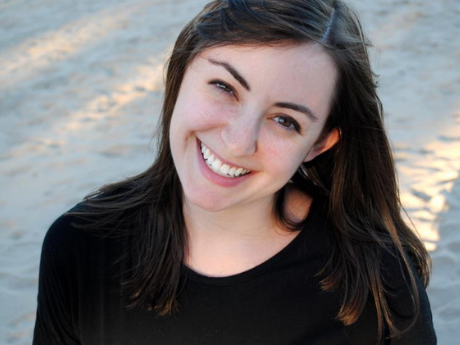Interviews
Poet Novelist: An Interview with Leigh Stein

So, you have one novel, The Fallback Plan, and one book of poems, Dispatch From The Future, both from Melville House. Do you think of yourself as a novelist, or a poet?
To me, poetry is who I "am," and prose is what I "do." So I am a poet who has written a novel. That being said, I've found that having my first novel published has given me more legitimacy as a writer (by which I mean at cocktail parties, it's more impressive to say I've written and published a novel than a collection of poetry). And now I'm working on a non-fiction project, so what does that mean? I think I'd rather be defined by my poet's sensibility than by whatever genre it is I happen to be working in.
On your blog you talk openly about a prejudice that exists against poetry, which is thought of as "stuffy, pretentious, humorless." Can you talk a little bit about how reactions to Dispatch From The Future and differed from reactions to The Fallback Plan?
I've gotten more fan mail about my poetry collection than about my novel. Last week, I got an email from a septuagenarian who read an interview with me, and was thrilled that I said, "Poetry doesn't have to be a private joke..." I've gotten other messages like this, thanking me for saying something out loud that everyone is thinking and no one is saying. A lot of people claim to hate poetry, but I suspect that they just haven't found the poet who moves them yet. My dad knows nothing about poetry, but he came to an event at which I read with the poet Mark Leidner, and my dad laughed so hard he cried, and bought Mark's book. I think it's the only book of poetry he's bought since he gave me Jewel's poetry collection for Christmas in 1999.
Esther, the protagonist of your novel, moves back into her parents' home and drifts into a babysitting job after earning a theater degree. Is there anything autobiographical in the difficulty she has facing the idea of a career as an artist?
That's an interesting question, and actually no one's asked it before (of course everyone assumes Esther is 100% me, but I've never been asked about Esther's identity as a theater artist in relation to mine as a writer). In this regard, I think Esther is my opposite. I've always been really ambitious and goal-oriented. Even when I lived at home with my parents (four times), I had a plan for what was next, and/or a creative project I was working on. Esther doesn't know what's next for her. She doesn't even know what she wants. I've blindly, naively, stubbornly been pursuing the life of an artist for years, and I have the credit card debt to prove it.
The obvious question, but one that holds a certain fascination for poets: how did you think the process of writing a novel differs from the process of writing poetry? Did one feel more natural to you?
I've always heard poems like music, often when I'm moving (walking, running, or riding the subway) and then memorizing the lines in my head to write down when I get back to my computer. I just feel like the channel the poetry moves through. It sounds hokey, but poets know what I mean. With prose, I have to practically chain myself to a desk and bribe myself with coffee and snacks all day, to produce the words I need. I usually set goals—between 500 and 1000 words a day. Sadly, the more prose I write, the less poems I write. I don't hear them like I used to, but the prose-writing is getting less torturous. I have a lot of conflicting feelings about this.
What are you working on next?
I'm working on a non-fiction project about grief and mourning in the digital age, inspired in part by the sudden death of my ex-boyfriend, who I lived with in New Mexico while writing my novel.


